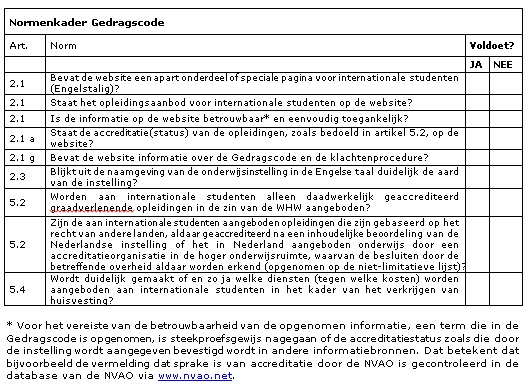Every year, the Committee carries out a survey into the provision of information on websites of six selected institutes of education. It concerns the provision of information on the range of programmes and the accreditation of the teaching, the premises, the name of the institute, the internal complaints procedures, and the complaints procedure for international students in the Code of Conduct. This year, the Committee has focused particularly on the information provided by e-mail and on Facebook. The Committee explored how institutes of education use social media to recruit and inform students. From the point of view of the code of conduct, this is a relevant question because websites are regarded as a key channel for informing students about the topics mentioned. But is that correct?
Use of social media
The survey was carried out at two institutes of education in late 2018. During an open discussion, both institutes talked about their policies on social media and information provision for international students. It became clear that the institutes use a large number of communication channels in their contacts with international students, including prospective students. The purpose for which students seek contact with an institute is a determining factor in the means that is used. Social media like Facebook, WhatsApp, and YouTube are used to provide information and to create a community feeling. They are also used to inform and inspire prospective and current international students. If a student has questions on more substantive matters, he or she is referred to information on the website or to the relevant employees at the institute. The website is therefore the primary source of information, but e-mail and Facebook are extensively used channels for students who have questions in a particular area.
For this reason, the Committee itself used e-mail and Facebook to ask questions of t he institutes, in addition to the check it carried out on their websites. A fictional profile of an international student was used for asking questions about the admissions procedures, language requirements, the quality of the programmes, and legal protection and assistance in the event of problems. These are matters about which the Code of Conduct contains guidelines. The Committee noted the response times and the completeness of the answers given. In cases where an institute referred someone elsewhere, the Committee looked at whether this was done correctly – to the right web page, for example, or brochure.
he institutes, in addition to the check it carried out on their websites. A fictional profile of an international student was used for asking questions about the admissions procedures, language requirements, the quality of the programmes, and legal protection and assistance in the event of problems. These are matters about which the Code of Conduct contains guidelines. The Committee noted the response times and the completeness of the answers given. In cases where an institute referred someone elsewhere, the Committee looked at whether this was done correctly – to the right web page, for example, or brochure.
Some findings
Results of e-mail/Facebook survey
The Committee used e-mail and Facebook to ask four questions to the selected education institutes. The speed with which the Committee’s questions were answered was particularly noteworthy. The e-mails were often replied to on the same day, or if not, the next day. In a previous survey, the Committee noted that the speed with which e-mails were answered could be a crucial factor in determining a person’s choice for one institute of education above another. From the various responses received, it appears that the use of standardized messages is commonplace. However, this leads in some cases to too much information being provided, but without the question actually being answered or, if the question has multiple aspects to it, the question only being partly answered. The latter is especially true with questions that require an individual, ‘custom-made’, response. In the survey, this was the case with a question about English-language skills. The use of standardized answers is understandable, but it is important to check that questions being asked are actually being answered. Also, the standardized texts should be regularly reviewed in order to verify the accuracy of their content.
Results of survey of websites
As was the case for the previous survey into the provision of information via websites, a system of standards set by the Committee was used. The system served as the basis for examining the websites of the selected institutes.

The Committee noted that the websites in question have clear, simple, and accessible information about the range of study programmes on offer. However, accreditation information is not always clear and, in some cases, is lacking altogether. In addition, it is not always clear to international students what accreditation actually means. This is further complicated by the fact that institutes use different names for the same study programme. As a result, it is not easy for students to check whether a programme features in the Accreditation Organisation of the Netherlands and Flanders databases, for example, or what type of information about the programme is available in Studyfinder. The Committee also looked at whether the institutes inform students about accommodation options and costs. Generally, the information provided is correct, but the Committee sees possible risks for students who are unable to use the information or who have been unable to find a room in time. There is currently no safety net available. The Committee emphasizes that the duty of care vis-à-vis accommodation extends beyond the provision of information. The Committee is therefore calling for more urgent efforts at making students aware of the need to look for accommodation at an early stage, and of the fact that there is a shortage of accommodation in some parts of the Netherlands.
The institutes were given the opportunity of responding to the findings. They stated that they found the survey useful for the purpose of tightening up their internal quality assurance procedures. The findings have led to alterations to the provision of information, and to the information itself being made clearer. The Committee will repeat the survey next year, selecting six other institutes of education.
If you would like to read more about the Committee’s survey, the full report (only in Dutch) you will find here.
Proposed survey of providers of preparatory years
A number of institutes of education use organizations that offer a preparatory year. Examples include such organizations as Cambridge Education Group, Navitas, and Study Group. In 2016, the Committee examined this type of education, which resulted in an article for the newsletter. As a follow up, the Committee would like to gain a clearer picture of how the relationships between these organizations and institutes are structured and how the quality of the programmes on offer is guaranteed. This was prompted by questions asked in the House of Representatives about preparatory year providers.
Does your institute of education offer preparatory years? If so, the Committee would like to learn of your experiences. Please e-mail your response to info@internationalstudy.nl


